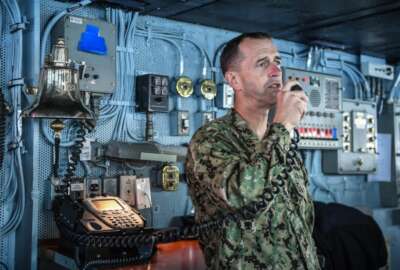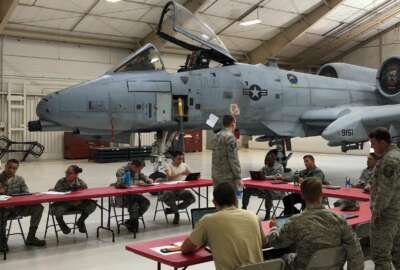
DoD needs to invest heavier in emerging tech to attract new companies, experts say
The Defense Department's small contract approach to emerging technologies isn't helping attract business, a panel of analysts told Congress.
Experts on defense innovation say the Defense Department needs to stop patronizing nontraditional companies with one-off contracts and competitions, and actually heavily invest in the technologies the Pentagon thinks will dominate the future.
DoD has talked a big game about innovation and the need to harness technologies like artificial intelligence, machine learning and automation, but experts like former John McCain staffer Chris Brose and former Defense Innovation Unit director Raj Shah say the money isn’t there to back it up.
“If we believe that the innovations transforming our daily lives, from self-driving cars to voice-activated televisions will be core to future national security, we should massively increase support to the organizations meeting these challenges head-on,” Shah told the Future of Defense Task Force on Wednesday.
The task force is a six-month venture created by the House Armed Services Committee, and led by Rep. Seth Moulton (D-Mass.), built to assess the military’s industrial base and long-term strategy.
“My recommendation would be to increase by tenfold the spend on successful innovation efforts such as the Air Force’s Pitch Day, DIU, Joint A.I. Center and many others,” Shah continued. “Additionally, increasing federal R&D to its historical levels of 1.1% would be very important.”
The 2020 defense research budget is the largest in 70 years, with $104 billion going to research, development, test and evaluation. However, nowhere near all of that is going to nontraditional companies or emerging technologies. Much of it will go into rebuilding the nuclear triad and modernizing weapons — something that relies heavily on traditional defense companies.
Brose warned that DoD’s research funding priorities are not ones that bring the kind of companies the Pentagon is trying to court.
“Since the end of the Cold War, in every technology sector in America there have been literally more than 100 startups that have grown to be valued at more than $1 billion; in the national security sector there have been only two,” he said. “This didn’t just happen. This was the result of incentives that we created in Washington, some conscious, some unconscious. Most detrimentally, we carved up what little money we have spent on research and development into lots of small contracts for lots of small companies that rarely make it across the valley of death that we’ve talked about this morning, rarely have become large scale military programs that enables new companies to grow.”
Shah said competitions like the Air Force Pitch Day are on the right track, but the investments are menial compared to what it takes to attract big name companies into the defense industrial base.
Brose told the task force that DoD needs to stop trying to make 1,000 flowers grow, and instead focus on smaller numbers of larger bets for the most promising capacities.
Brose is basically saying “if you fund it, they will come.” DoD doesn’t need to reinvent the wheel, but if it offers large, prime contracts on emerging technologies then private companies with the capabilities will vie for that money and work with the Pentagon.
Shah also offered a handful of recommendations.
“Reopen a major military installation in each of our leading innovation centers, San Francisco and Boston, to help build personal community relationships; establish a national security innovation visa to fast track green cards for experts in key technical fields; increase opportunities for civilian service through a STEM Corps; and expand reserve and national service opportunities,” he said.
He added that Congress needs to continue to build in contracting vehicles that make it easier for nontraditional companies to work with DoD and that the Pentagon needs to work more with its allies to build technology marketplaces.
Finally, he said DoD needs to improve its talent acquisition to incentivize smart, inventive people to work for the department.
Copyright © 2024 Federal News Network. All rights reserved. This website is not intended for users located within the European Economic Area.
Scott Maucione is a defense reporter for Federal News Network and reports on human capital, workforce and the Defense Department at-large.
Follow @smaucioneWFED






